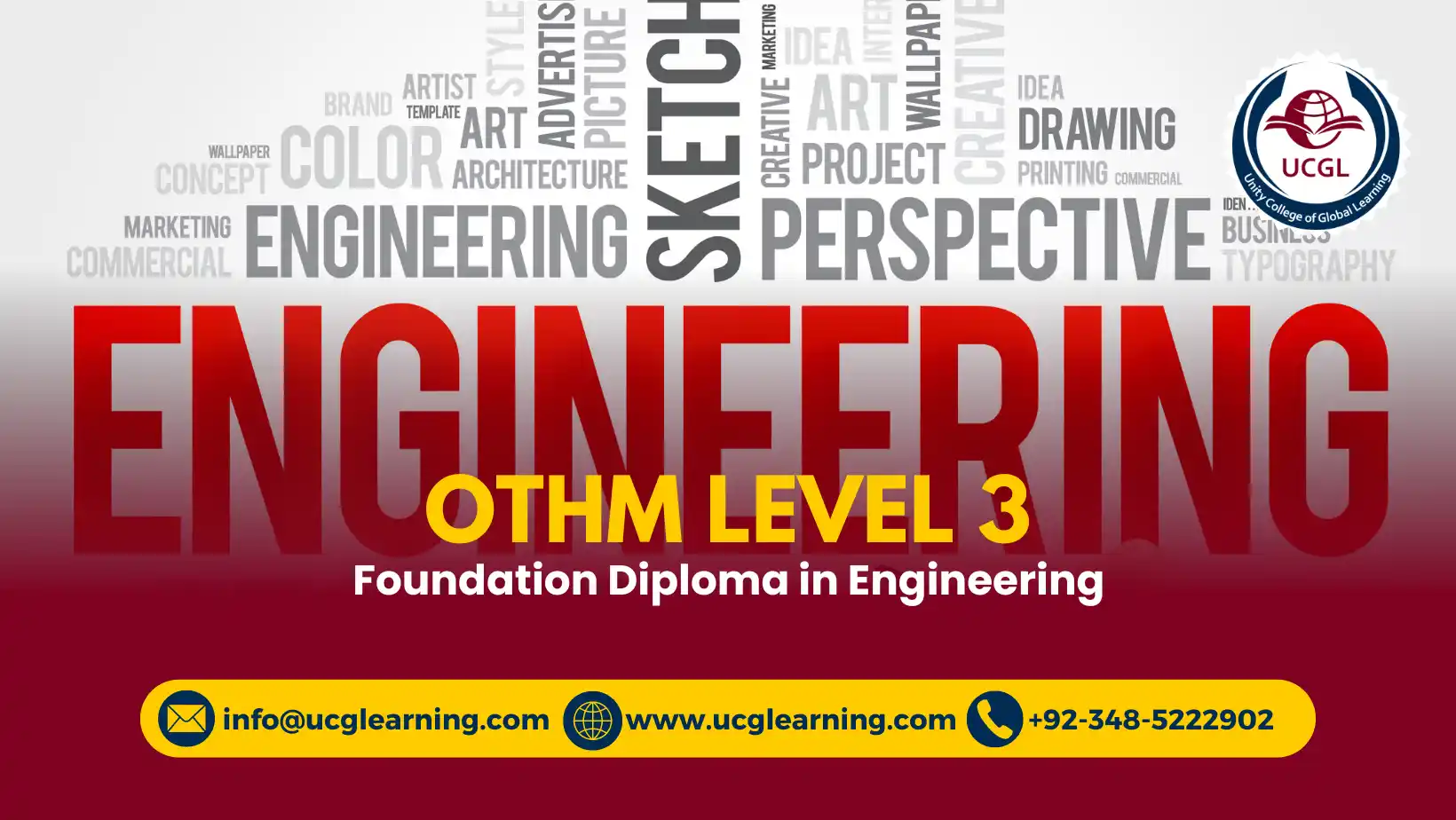OTHM Level 3 Foundation Diploma in Engineering
The Level 3 Foundation Diploma in Engineering offers a comprehensive introduction to the principles and practices of engineering. The course combines theoretical knowledge with practical skills, ensuring that students are well-prepared for the challenges of the engineering industry. Covering various engineering disciplines, this diploma provides a broad understanding of the field, enabling students to explore different areas of interest before specializing.
Course Introduction
Engineering is at the heart of innovation, driving advancements in technology, infrastructure, and industry. The Level 3 Foundation Diploma in Engineering is designed to provide aspiring engineers with the essential knowledge and skills needed to embark on a successful career in this dynamic field. Whether you aim to enter the workforce directly or continue your studies at a higher level, this diploma serves as a solid foundation.
Course Benefits
- Foundation in Engineering Principles: Gain a solid grounding in key engineering concepts, preparing you for further study or entry-level roles.
- Hands-on Experience: Develop practical skills through laboratory work, projects, and real-world applications.
- Industry-Relevant Skills: Learn skills that are directly applicable to the engineering industry, increasing your employability.
- Pathway to Higher Education: Use this diploma as a stepping stone to pursue higher-level engineering qualifications.
- Career Flexibility: Explore various engineering disciplines, allowing you to make informed decisions about your future specialization.
Course Study Units
- Engineering Principles (10 credits)
- Design Technology (10 credits)
- Electricity (10 credits)
- Mechanics (10 credits)
- Introducing Statistics (10 credits)
- Mathematics (10 credits)
Learning Outcomes
- Engineering Principles (10 credits)
- Understand fundamental principles of engineering, including mechanics, thermodynamics, and materials science.
- Apply engineering principles to analyze and solve engineering problems.
- Demonstrate knowledge of engineering ethics, standards, and practices.
- Evaluate the impact of engineering solutions on society, environment, and sustainability.
- Design Technology (10 credits)
- Understand the principles of design thinking and technological innovation.
- Apply design processes and techniques to develop innovative solutions to technical problems.
- Demonstrate proficiency in using design tools and software for modeling and prototyping.
- Evaluate design solutions based on criteria such as functionality, usability, and manufacturability.
- Electricity (10 credits)
- Understand the principles of electricity and electrical circuits.
- Analyze electrical components, laws, and theories, such as Ohm’s Law and Kirchhoff’s Laws.
- Apply electrical principles to design and troubleshoot electrical circuits.
- Demonstrate proficiency in using electrical instruments for measurement and testing.
- Mechanics (10 credits)
- Understand the principles of mechanics, including statics and dynamics.
- Analyze forces, moments, and equilibrium of rigid bodies.
- Apply principles of mechanics to solve problems related to structures, machines, and mechanisms.
- Evaluate mechanical systems for efficiency, stability, and safety.
- Introducing Statistics (10 credits)
- Understand basic statistical concepts, methods, and techniques.
- Analyze and interpret data using descriptive and inferential statistical methods.
- Apply statistical techniques to analyze variability, trends, and relationships in data sets.
- Evaluate the reliability and validity of statistical analyses in engineering and scientific contexts.
- Mathematics (10 credits)
- Understand and apply fundamental mathematical concepts relevant to engineering, including algebra, calculus, and geometry.
- Solve engineering problems using mathematical methods such as differential equations and vector calculus.
- Apply mathematical modeling techniques to analyze and predict engineering phenomena.
- Demonstrate proficiency in using mathematical software and tools for engineering calculations and simulations.
These learning outcomes aim to provide students with the foundational knowledge, skills, and competencies necessary for understanding and applying engineering principles, design technology, electricity, mechanics, statistics, and mathematics in various engineering disciplines and technical fields.
Who is this Course For?
The Level 3 Foundation Diploma in Engineering is ideal for:
- School leavers who wish to pursue a career in engineering.
- Individuals seeking to gain foundational knowledge before specializing in a specific engineering discipline.
- Those looking to enhance their employability with practical engineering skills.
- Anyone interested in a stepping stone to higher education in engineering.
Future Progression
Upon completion of the Level 3 Foundation Diploma in Engineering, students have several progression options:
- Higher Education: Continue your studies by enrolling in a Level 4 or Level 5 engineering course, such as a Higher National Certificate (HNC) or Higher National Diploma (HND) in Engineering.
- University Degree: Pursue a bachelor’s degree in an engineering discipline at a university.
- Apprenticeships: Enter the workforce through engineering apprenticeships, gaining practical experience while furthering your education.
- Entry-Level Employment: Begin your engineering career in various industries, such as manufacturing, construction, or technology, in entry-level positions.
The Level 3 Foundation Diploma in Engineering is a comprehensive and flexible course that opens doors to numerous opportunities in the engineering field. Whether you aspire to advance your education or start your career, this diploma equips you with the knowledge and skills necessary to succeed. Embark on your engineering journey today and become a part of the innovative world of engineering.







